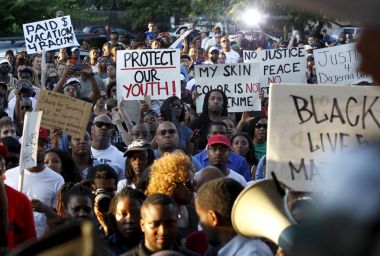McKinney video: The Church is not living up to its radical past on race

A teenage girl wearing a bikini is screaming. She is sat on by a police officer, who handcuffs her while she is in obvious distress. Somone shouts out that the officer has drawn his gun.
A video of this incident – which took place in McKinney, Texas, last Friday – was posted on YouTube and picked up by the national press, which lead to the suspension of the police officer in question. Some commentators have observed that the young girl's only crime was simply "swimming whilst being black." This should have been a fun evening celebrating the end of her exams but instead turned into an evening she will never forget. Coming so soon after the shooting of unarmed black young man, Michael Brown, in Ferguson and the mass demonstrations after the acquittal of the police officer that shot him, this is another sad chapter in US race relations. Perhaps it is an opportune time to pause and reflect.
The camera is mightier than the gun
At the same time that some fear government agencies are using our digital devices to monitor our behavior, the ubiquitous smart phone is turning each of us into a potential citizen reporter. Rather than Big Brother watching us, we are using our handheld devices to keep an eye on Big Brother. The ability to stream live to the internet means that even if a phone is confiscated, a video – and therefore a story – can be made available immediately. The smart phone can be a powerful weapon against injustice and oppression, how will you use yours?
The Church has not lived up to its radical past on race
I recently watched the incredibly moving film Selma, which retells the story of the civil rights movement. The Christian faith was the driving force behind the fight against racial injustice in the US, and led to deliberately non-violent resistance. In a bizarre twist of fate, the Church is now seen to deny freedom and suppress equality. Secular revisionism is retelling the story of equality in a way that suits its position and that denigrates Christianity. The problem is; on race relations at least, the Church in the US, and sadly also in the UK, lacks credibility to speak up – half a century after the huge victories won by the civil rights movement, the Church remains segregated. Martin Luther King said "it is appalling that the most segregated hour of Christian America is eleven o'clock on Sunday morning", and his words seem as true now as ever in the churches I have visited. Apart from the odd token rally or event and a tiny smattering of multicultural churches, the Church has not been able to model racial diversity or family unity that could offer a prophetic challenge to the division that still persists in our society.
The opportunity is before us
As people of God we affirm that in Christ "There is neither Jew nor Gentile, neither slave nor free, nor is there male and female, for you are all one in Christ Jesus," (Galatians 3.28). Of course this does not mean that we cannot recognise anatomical differences between men and women, or cultural differences between Jews or Gentiles, but we understand that thanks to the reconciling work of Christ, what used to divide the ancient world giving superior status to one and not to the other has been subverted. In the Church, the love, respect and dignity that we are to show one another should not be affected by race, rank or gender. In this highly sensitised time, we the Church must work harder to demonstrate in our common life the reconciling love of God.
When King marched from Selma to Montgommery, many white clergy joined him, risking life and limb to walk in solidarity with their black sisters and brothers. This is a picture of the Church at its best; acting as a prophetic sign, a taste of the coming kingdom and a challenge to the powers of evil. What is there that you have the power to do that will help show how the gospel builds bridges of love and fellowship outside of the demographic dividers that our culture has erected? The world seems to be screaming out for that kind of love.
Krish Kandiah is a contributing editor to Christian Today. He is president of London School of Theology and founder and director of Home for Good. You can follow him on Twitter: @krishk











